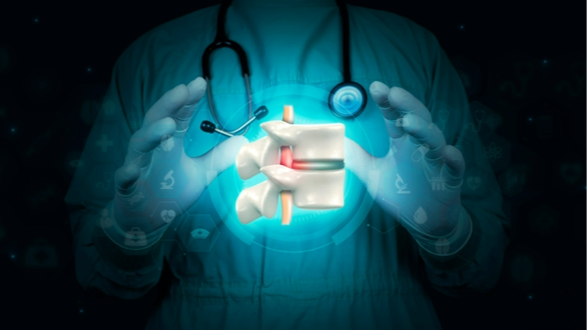Understanding Slipped Disc: Causes, Symptoms, and Treatment
A slipped disc, also known as a herniated disk, occurs when one of the rubbery cushions (discs) between the individual bones (vertebrae) that stack up to make your spine becomes damaged. The condition can lead to pain, numbness, or weakness in an arm or leg. However, some people may experience no symptoms at all.
What is a Slipped Disc?
The discs in your spine are made up of two main parts: a soft, gelatinous inner portion called the nucleus pulposus, and a tough, outer ring called the annulus. A slipped disc occurs when the inner portion protrudes (or herniates) through a weak area in the outer ring. This can compress and irritate a nearby nerve. Depending on where the herniated disc is located, you may feel pain, numbness, or weakness in the arm or leg.
Risk Factors and Causes
Several risk factors can increase your chances of experiencing a slipped disc. These include:
- Age: As we age, our discs begin to lose their water content, making them less flexible and more prone to tearing or rupturing with even a minor strain or twist.
- Occupation: Jobs that require repetitive lifting, pulling, bending, or twisting are particularly hard on the discs in your spine.
- Weight: Excess body weight puts more pressure on the discs in your lower back (lumbar spine).
- Lifestyle Choices: Smoking can reduce the oxygen supply to the disc, causing more rapid degeneration, while a sedentary lifestyle can make your back more prone to injury.
- Genetics: There is some evidence to suggest that certain types of disc degeneration are inherited.
Symptoms to Watch For
Symptoms of a slipped disc may include:
- Pain and Numbness: Usually on one side of the body
- Arm pain or leg pain
- Pain that worsens at night or with certain movements
- Pain that worsens after standing or sitting
- Pain when walking short distances
- Unexplained muscle weakness
- Tingling, aching, or burning sensations in the affected area
The types of pain can vary from a mild ache to a sharp, burning sensation or excruciating pain. Sometimes, it can feel like a jolt or electric shock. Coughing, sneezing, or sitting in a certain position can lead to increased nerve pain as it may increase pressure on the nerve root.
It's time to get back to doing what you love.
Diagnosis and Treatment
To diagnose a herniated disc, your doctor will check your medical history and perform a physical examination. They may check for muscle strength, reflexes, walking ability, and your ability to feel light touches, pinpricks, or vibrations.
Your doctor may request imaging tests, such as X-rays, MRI, or CT scans, to confirm the diagnosis and location of the herniated disc and affected nerves.
Most people with a slipped disc can benefit from conservative treatment. This may include:
- Rest: A short period of rest and avoidance of activities that exacerbate the pain is beneficial. However, prolonged bed rest is not advisable.
- Physical Therapy: Your physical therapist will design an exercise program to improve flexibility and strength, relieve pain, and help you return to your normal activities.
- Medications: If over-the-counter pain medications are not effective, your doctor may prescribe NSAIDs (nonsteroidal anti-inflammatory drugs), muscle relaxers, or in some cases, steroids to reduce inflammation and pain.
- Heat or Cold: Initial treatment at home might include a heat pad or ice pack applied to the painful area for relief.
Surgery is only considered when conservative treatments have not provided relief, or if you’re experiencing severe symptoms such as progressive muscle weakness, unremitting pain or loss of bladder or bowel control.
Preventing a Slipped Disc
Although it’s not always possible to prevent a herniated disc, you can take measures to reduce your risk:
- Exercise: Strengthening the trunk muscles helps stabilize and support the spine.
- Good Posture: Maintaining good posture reduces pressure on your spine and discs. Lift heavy objects properly, making your legs — not your back — do most of the work.
- Maintain a Healthy Weight: Excess weight puts more pressure on the spine and discs, making them more susceptible to herniation.
- Stop Smoking: Smoking decreases the oxygen supply to the discs and causes more rapid degeneration.
When to See a doctor
If you’re experiencing persistent pain in your back or leg that causes numbness or tingling, or if you have pain that isn’t improving with self-care measures, it’s time to see your doctor.
In rare cases, a slipped disc can cut off nerve impulses to the cauda equina nerves in your lower back and legs. If this occurs, you may lose bowel or bladder control.
Another rare complication is saddle anesthesia, in which you lose sensation in the inner thighs, back of the legs, and around the rectum. These conditions require immediate medical attention.
Understanding the risk factors, symptoms, and treatment options for a slipped disc can help you make informed decisions about your health. If you suspect a herniated disc, consult with a healthcare professional to get a proper diagnosis and treatment plan.
Remember, early intervention can mean a quicker recovery and a faster return to your normal activities.

About Dr. William S. Cobb
Dr. William Cobb is an accomplished neurosurgeon in North Jersey and a proud member of Neurosurgeons of New Jersey, practicing out of their Ridgewood office conveniently located on East Ridgewood Avenue. During his Neurological Surgery residency, he became passionate about the development and treatment of brain tumors affecting the brain and spine. Dr. Cobb uses state-of-the-art technology for surgical intervention in the treatment of tumors of the brain and spine including Gamma Knife radiosurgery. He has vast experience in using modern minimally invasive surgery for the treatment of degenerative spine and intervertebral disc disease. Dr. Cobb serves as the Director of Neurosurgical Oncology at Valley Hospital. He's accepting new patients.






